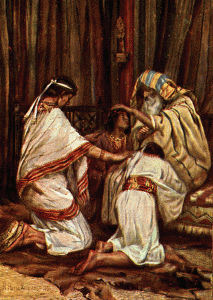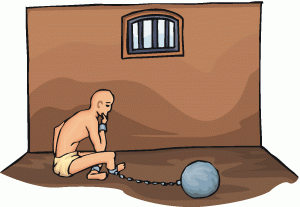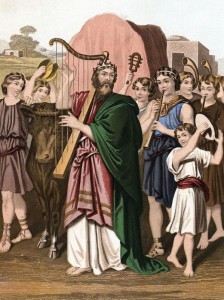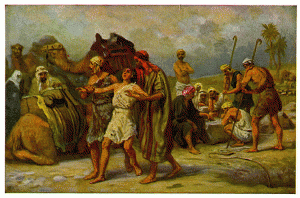(This post is an excerpt from a larger article Natan has written entitled, “Is America in End-Time Bible Prophecy,” which is available at http://www.hoshanarabbah.org/pdfs/america.pdf.)
Who Are the Ancestors of the Modern Arabs? Bible Prophecy Will Repeat Itself in the End Times.
Genesis 36. Esau and his army stood in the way preventing Jacob from returning to his homeland. This event is prophetic of what will happen in the end times.
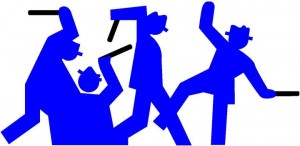
We have already identified who the sons of Jacob are, how they were divided into two camps, or two houses, and two kingdoms (the northern kingdom of Israel and the southern kingdom of Israel). But who are the descendants of Esau?
Many, if not most of the modern Moslems (especially the Arabs) trace their lineage back if not biologically then spiritually to Ishmael, the son of Abraham by Hagar. Islam in its holy book, the Koran, claims that it was Abraham and Ishmael who founded the religion of Islam and built the Kaaba, which is the small building containing a stone that supposedly fell from heaven. This shrine is located in the midst of great mosque in Mecca, Saudi Arabia. Of Ishmael and his descendents, the Bible prophesies in Genesis 16:11–12,
The angel of YHVH said to her further, “Behold, you are with child, And you shall bear a son; and you shall call his name Ishmael, because YHVH has given heed to your affliction. And he will be a wild donkey of a man, his hand will be against everyone, and everyone’s hand will be against him; and he will live to the east of all his brothers.”
The Koran has further twisted the biblical account to teach declare that the patriarchs were Mulims and that Abraham gave the birthright blessing to Ishamael instead Isaac. Both Israelites and Arabs, therefore, believe that they have a right to the Promised Land of Canaan, and, hence, this disagreement roots of the modern Arab-Israeli conflict.
The Scriptures further record that Esau (Edom), the disinherited son of Isaac, also had ought against his brother Jacob, who, in a sense, stole the birthright promise from him. Furthermore, Esau married the daughter of Ishmael (Gen 28:9). Thus, some of Ishmael’s and Esau’s descendants merged becoming a people-group who had a jealous feud with the sons of Jacob or Israel.
The Bible has more to say prophetically about the descendants of Esau, who scripturally are referred to as Edom (Esau’s alternate name) than about those of Ishmael. Edom is portrayed as an aggressive and bloodthirsty people who are opposed to Israel at every step. We will discover what the Scripture have to say about this below.
In the mean time, let’s take a closer look at Edom.
- Esau and Edom (meaning “red”) are synonymous (see Gen 25:25, 30; 36:1, 8–9, 19, 43).
- Esau intermarried with the descendants of Ishmael (Gen 28:9).
- Seir is another name for the land of Edom (Gen 32:3; 33:16; 36:8).
- Esau intermarried with the people of Canaan (Gen 36:2). He intermarried with the Hittites, the Hivites, as well as the Ishmaelites.
- His descendants included the Amalekites (Gen 36:12, 16) who fought against the Children of Israel upon leaving Egypt and as soon as they had entered the wilderness en route to the Promised Land (Exod 17:1).
- Esau’s sons were dukes or chieftains (leaders of clans) and kings (Gen 36:15–16, 40–43).
- Although Esau’s direct lineage was confined to the area of the traditional land of Edom, it is clear from the biblical record that he and his descendants intermarried with many of the neighboring nations, so that his descendants were scattered far and wide over the region that later became known as the Holy Land.
The entire one-chapter Book of Obadiah is a prophecy against Edom. Let’s note several key points in this prophecy that might help us to understand some things about Edom in light of end-time Bible prophecy. This will in turn help us to understand end-time world politics and give us a further clue in identifying America in prophecy. Let’s analyze some key verses in Obadiah in light of end-time events.
Verse 2, The descendants of Edom are greatly despised (scorned, held in contempt, disdained).
Verse 3, They dwell in the clefts (places of concealment, retreats) of the rocks, they are proud and view themselves as invincible.
Verse 4, YHVH promises to bring Edom down.
Verse 7, Edom has a confederacy (league, alliance) of nations, which include many of the modern Moslem and Arab nations.
Verse 11, Edom’s eyes are on Jerusalem. Edom along with his foreign allies will cast lots for Jerusalem (seek to divide it among the nations/religions of the world as an international city under the control of the United Nations?).
Verse 13, Edom has entered into the gates of the land of Israel in the day of her calamity/disaster.
Verse 14, Edom will kill Jewish refugees trying to escape the land of Israel in her time of distress.
Verse 15, The time frame of the fulfillment of these prophecies is “near” the day of YHVH, when he will judge Edom and the other heathen nations.
Verse 16, Edom will be drinking (celebrating?) on the Temple Mount/YHVH’s “holy mountain,” and as a result, they shall drink the cup of YHVH’s wrath.
Verse 17, The house of Jacob will get the Temple Mount back!
How many descriptions of the modern Palestinian and other Islamo-terrorists do we see in Obadiah? What other people-group fits this description? Is Edom a picture of many modern-day Palestinians and their Moslem backers who hate the Jews, the state of Israel and America?
We have learned who Jacob represents in end-time prophecy. Now we learn who Jacob’s descendants’ arch-enemy will be and who will attempt to prevent them from returning to the land of Israel. This will happen in the end times before the coming of the Messiah. We will learn more about this later.


